HEAL calls on European Commission President Ursula von der Leyen to commit to protecting people’s health from the triple crisis during her second term in a letter. HEAL urges her to safeguard and strengthen the EU climate and environmental acquis for better health, and accelerate on the zero pollution path, including for the foreseen reform of the EU chemicals law REACH.
November 2017 –The yearly UN Climate Change Conference took place in Bonn, Germany from 6 to 17 November this year. HEAL sent a 16 head strong delegation to Bonn to emphasise that measures to bring down CO2 emissions will not only improve the climate but will also bring huge health benefits.
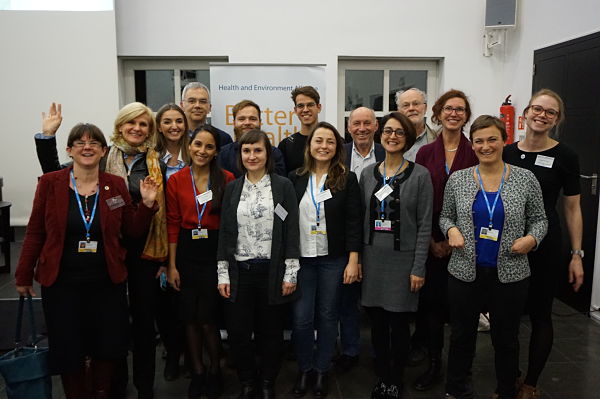
HEAL’s delegation, accompanied by Dr Maria Neira from the WHO. From left to right: Anne Stauffer, Dr Maria Neira, Vijoleta Gordeljevic, Dr. Kayihan Pala, Eva Takaria, Florian Drueke, Marlena Kropidlowske, Oleksandr Kuzura, Funda Gacal, Dr Winfried Zacher, Dr. Gamze Varol Saracoglu, Dr Dieter Lehmkuhl, Génon K. Jensen, Elke Zander, Nienke Broekstra
HEAL Executive Director Genon K. Jensen wrote in an article in the run up to COP23: Climate change is more than an environmental challenge – it is a major threat that affects health, wellbeing and human rights, and disproportionately impacts those most vulnerable, such as children, and the poor. In turn, this means climate action presents incredible opportunities for our health: decarbonising our societies and way of life – be it in transport, buildings, energy or food systems – is entirely possible and will make this world a healthier, increasingly prosperous and more sustainable place. Read the full article here.
The weekend before the official start of the COP23, on Saturday 4 November, HEAL, together with German medical students, joined a climate march organised by a big alliance of environmental NGOs in Bonn. The march was the biggest gathering in Germany to demand the phase out of coal ever. Prior to the march, HEAL co-launched the Beyond-Coal campaign, which calls for an end to coal power generation in Europe by 2030.
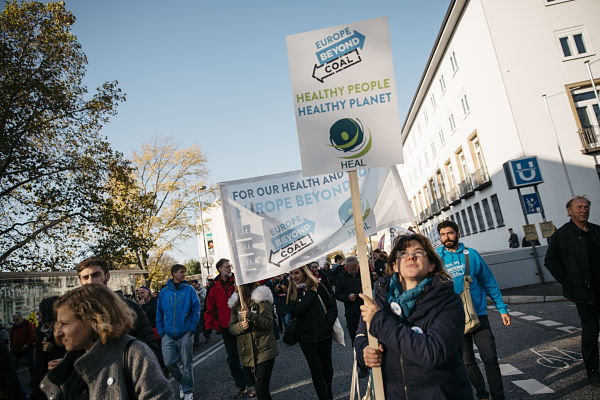
Anne Stauffer joining the climate march in Bonn on 4 November
Social media: http://bit.ly/2zFVQHw, http://bit.ly/2iYLqZe
On Friday 10 November the Lancet Countdown presented their most recent report, entitled The Lancet Countdown on health and climate change: from 25 years of inaction to a global transformation for public health, with three key conclusions: 1) climate change is unequivocal and potentially irreversible, 2) delayed response to climate change has jeopardised human life, and 3) there has been an accelerated response to climate change and there are opportunities for public health.
On Saturday 11 November the Global Climate and Health Summit took place, organised by the Global Climate and Health Alliance, the WHO and HEAL. Health actors from all over the world were brought together to discuss not only the importance of highlighting health in the climate debate but more importantly, to exchange and highlight ways to work more effectively together and learn from each other, as health professionals all over the globe are engaged in many ways to tackle climate change and boost health.
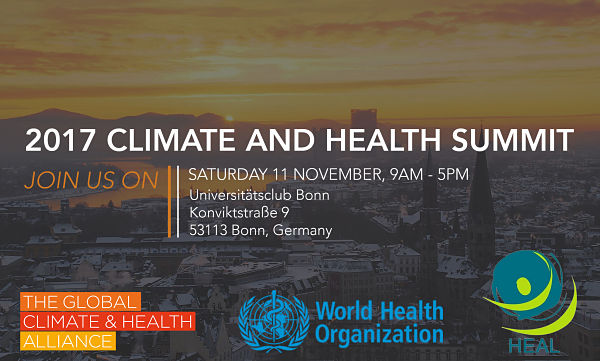
Amongst the speakers was Dr Maria Neira, WHO director of the department of public health and environment department, who emphasised that 23% of global deaths are related to the environment and that especially air pollution is a global health crisis that needs to be addressed. Nick Watts, executive director of the Lancet Countdown, mentioned that although climate change is potentially irreversible, there is reason to be optimistic since the global response to it has increased. After inspiring speeches and a panel in the morning, the World Café afternoon session of the Summit, organised by HEAL, highlighted the deep and diverse expertise of the GCHA member organisations.
The meeting also saw many health professionals and medical students from Germany participate, and provided food for thought on how to advance climate and health considerations in Germany, especially with the new government. Members of the alliance of critical health professionals in Germany (Kritische Medizinner*innen Deutschland) have recently adopted a position paper on climate change and health.
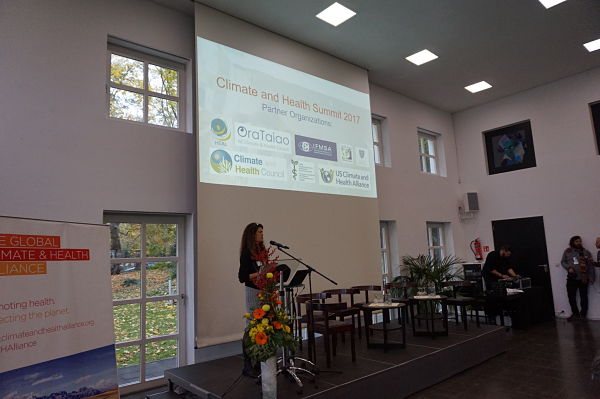
Jeni Miller, executive director of the Global Climate and Health Alliance, moderating the event
Social media: http://bit.ly/2z1iTJ7, http://bit.ly/2j8p4EK, http://bit.ly/2mHjJcm, http://bit.ly/2hG4QBK
On the same day, a panel discussion organised by HEAL took place in the Turkish Country Pavilion at the COP23 venue. For the first time at a COP gathering, the health impacts of energy policies in Turkey were discussed. HEAL’s Funda Gacal and Vijoleta Gjordelevic spoke together with Prof Dr Kayihan Pala, Assoc.Prof. Dr Gamze Varol Saracoglu and Arif Cem Gündogan from Ecology Collective, highlighting the health harm that especially coal is causing in Turkey and presenting findings from the recently launched Turkish version of HEAL’s report “Hidden Price Tags- How ending fossil fuel subsidies would benefit our health”. The participation of the HEAL Turkish delegation members was made possible in cooperation with the Heinrich Böll Stiftung e.V.
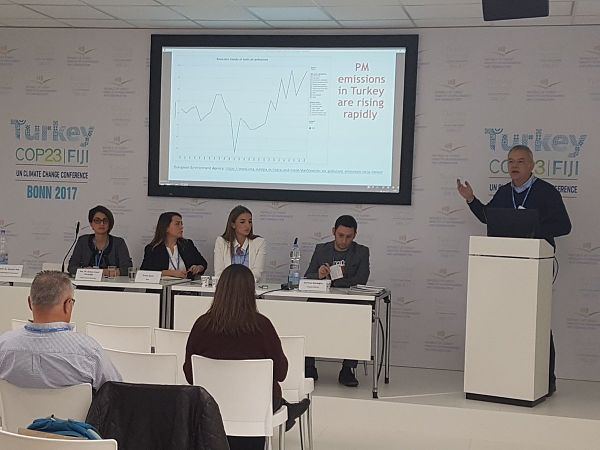
Prof. Dr. Kayihan Pala discussing emission in Turkey. From left to right: Dr. Gamze Varol Saracoglu, Funda Gacal, Vijoleta Gordeljevic, Arif Cem Gündoğan, Dr. Kayihan Pala
Social media: http://bit.ly/2z6lENr, http://bit.ly/2mwDAuV
Sunday 12 November brought health to the centre of the climate debate at the COP Presidency’s High-Level Event on Health: Health Actions for the Implementation of the Paris Agreement, with Dr Tedros Adhanom Ghebreyesus , the WHO’s new Director-General , Frank Bainimarama, COP 23 President and Prime Minister of the Republic of Fiji, Patricia Espinosa, UNFCCC Executive Secretary and Arnold Schwarzenegger, R20 Founding Chair and Former Governor of California opening the debate. One of many memorable quotes from the day came from Mr Schwarzenegger “No one should be allowed to talk about Climate Change any more, without talking about its impact on our health!”
Social media: http://bit.ly/2inzBw3
HEAL’s Vijoleta Gjordelevic was also given the opportunity to meet the new WHO Director General Dr Tedros Adhanom to discuss how to strengthen collaboration between WHO and civil society organisations such as HEAL on tackling the negative impacts of climate change and other environmental threats such as pollution on human health.
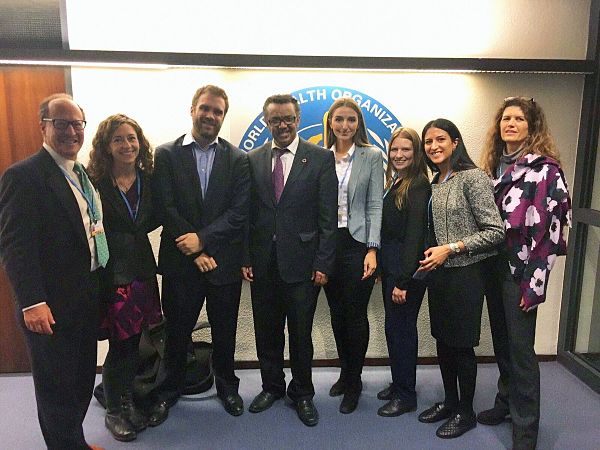
From left to right: Josh Karliner, Dr Courtney Howard, Dr Nick Watts, Dr Tedros Adhanom, Vijoleta Gordeljevic, Sanne de Wit, Lujain Al-Qodmani, Jeni Miller
Social media: http://bit.ly/2imdm9S
On Monday 13 November, Genon Jensen, HEAL’s Executive Director spoke at the event “Climate Change, Air Pollution, and Health – Maximizing Benefits in Cities” , organised by the WHO, ICLEI, and Climate and Clean Air Coalition. Throughout COP23, there was a call for increased involvement and commitment by regions and cities to help tackling climate change. Genon highlighted how the Unmask My City campaign works for better air quality within cities and stressed the importance to have the voice of the health community in climate talks.
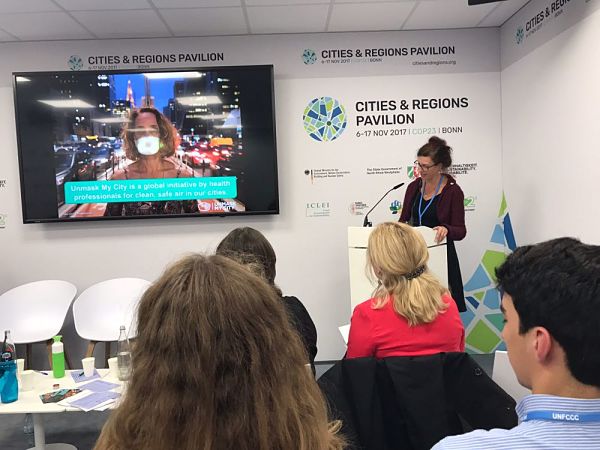
Génon K. Jensen talking about Unmask My City during COP23
Social media: http://bit.ly/2hw5IbW
What COP23 meant for health and climate
COP23 is oftentimes described as an “intermediate COP”, focusing on developing the Paris Climate Agreement guidelines, which are due by COP24 in Poland next year (November 2018). However, the Bonn COP saw good progress being made on highlighting health and risks to health from climate change.
A central building block of this was the engagement of many global health actors that have been working on making health heard in the climate negotiations for years. This way, COP23 has seen a strong health voice adding a crucial angle to the climate discussion – a voice powered by the WHO, the Global Climate and Health Alliance and HEAL as well as the recently launched Europe Beyond Coal campaign next to many others groups working on health and climate globally.
A critical development happened already leading up to the COP: Dr. Tedros Adhanom, the new Director General of the World Health Organisation has made health and climate change one of only 5 priorities for the WHO and has put a strong focus on impacts in the new WHO work programme; one of them referring specifically to decreasing premature deaths from air pollution.
Furthermore, during COP, the WHO announced together with the UN Climate Change secretariat and the Fijian COP23 Presidency the launch of a New Small Island Developing State (SIDS) Health initiative. This initiative aims to protect the health of people living in SIDS affected by climate change. The goal is to increase financial support from international actors for this issue.
The demand to phase out coal power, the most health harmful fossil fuel, was also a key point of the whole COP deliberations. Just ahead of COP23, the Europe Beyond Coal campaign was launched, Michael Bloomberg advocated for coal’s rapid phase out, health professionals highlighted its adverse impact on health, and world leaders took action to abandon coal, such as the Powering Past Coal Alliance, launched by Canada and the UK on 16 November 2017. The alliance aims at rapidly phasing out traditional coal power. 25 different countries and regions joined the initiative amongst which Fiji, Washington, Costa Rica, Italy, the Netherlands, and Angola. They aim to grow to 50 partners by the COP24 next year. HEAL was happy to see that health was highlighted as a key argument for a coal phase-out by Minister McKenna who mentioned the direct link between coal power generation and premature deaths.
COP23 has given HEAL the opportunity to highlight that ultimately what’s at stake when we talk about climate change are people – their livelihoods and their health. While progress on climate action has been still too slow, momentum is building in a right direction and HEAL and its partners will continue to be the voice of citizens worldwide demanding clean air, healthy energy options, food and transport systems, for a healthy planet for healthy people.
Read the official COP23 declaration here.


